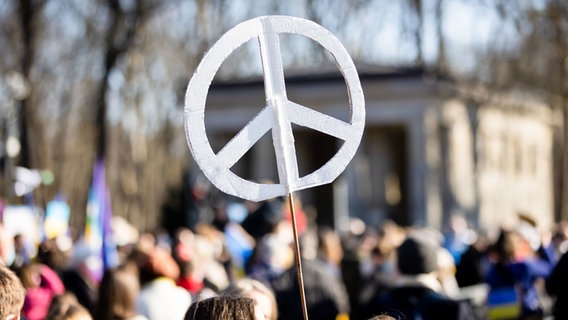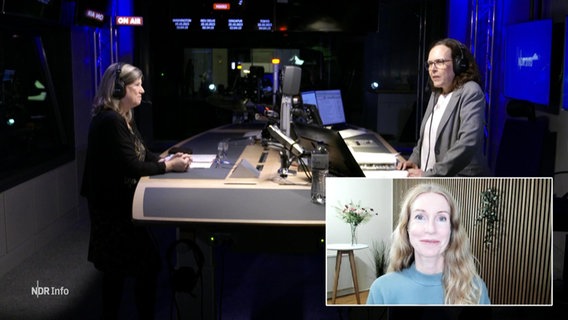
Crises and fear of the future: How we strengthen our resilience | NDR.de – Guide
Status: 10.10.2023 12:18 p.m.
Corona, the war in Ukraine, the climate crisis and most recently the attack on Israel: the constant crises scare many people. By strengthening our resilience, we can deal with them better. Tips from the expert.
There was a time when bad news might shock us, but rarely affected us directly. That changed with the start of the Corona pandemic in March 2020, and since then one crisis has followed another: the war against Ukraine, the climate crisis, the steadily rising cost of living and, most recently, the Attack on Israel.
“The constant confrontation with bad news in the media and the feeling of not being able to solve it puts our brain under constant stress,” says René Träder, coach for resilience and stress management. “Stress can come, but it must also go away again,” says Träder. Long-term stress can lead to gastrointestinal problems, sleep disorders, heart palpitations and, in severe cases, depression. One way to better deal with stress, fears and worries is to strengthen our resilience.
Resilience – what is it?
In psychology, resilience is the term used to describe psychological resilience, i.e. the ability of a person to survive difficult life situations without lasting impairment and to endure stress. People’s resilience varies greatly. For example, losing a job can be very stressful for a less resilient person and trigger negative feelings in the long term. On the other hand, someone who is resilient can probably accept the loss quickly, look for a new job and look back on the positive aspects of the job change. Strong resilience helps us deal with crises and allows us to emerge from them stronger.
Recognizing your own overload
The first step to strengthening resilience is to recognize your own limits, explains René Träder: “It is completely okay to be overwhelmed in these times of crisis.” However, showing weakness is difficult for many people. Psychologist Kamila Skolik, for example, found that many of her clients are currently plagued by money worries. She advises talking to family and friends about it. “It’s good to realize that you are not alone,” says Skolik. Because the probability that others feel the same is high: According to a study, Study by R+V Insurance on the “fears of the Germans” two thirds of Germans fear rising living costs in 2022.
Strengthen resilience: find solutions and act
Even if we can neither predict nor control many developments, it is important to recognize that we can make a difference for ourselves and in our immediate environment and to switch from a passive to an active role. “We can do a lot for our resilience if we make decisions,” explains René Träder. One decision can be to ask for help when experiencing emotional difficulties and accept it, or to change employers to improve one’s own financial situation. Anyone who is in acute financial need can perhaps ask friends or relatives for financial support, says Träder. There may be unused financial help from the government or donations from other institutions.
Become capable of action and leave the “victim role”
A crucial factor and probably the most difficult part of strengthening our resilience is to get out of the victim role. “The longer we remain in this role, the less able we become to act,” explains the resilience expert. Seeing oneself as a victim of politics and the economy is understandable in this situation, but not helpful. It is important to recognize one’s own individual ability to act and to work on concrete solutions to improve one’s own situation.
Limit media consumption

Constantly dealing with bad news impairs your ability to think in a solution-oriented way.
Many people are constantly exposed to news through smartphones, social media and breaking news. But if we are constantly pondering the big problems, we are impairing our ability to think rationally and in a solution-oriented way. And if you don’t want to deal with the news in the evening, you don’t have to feel guilty: “If you protect your mental health, you are practicing mental hygiene and that is very important. We must not lose our optimism,” says Träder. If you only watch the news once a day, you will get everything and remain able to act because you will not be under constant stress.
Assess risks realistically
“We often misjudge the world,” explains Träder. After the attack on Berlin’s Breitscheidplatz in 2016, many people were afraid of becoming victims of a terrorist attack at Christmas markets. The fact that the probability for individual people is statistically very low did not change this fact. When the great media attention for terrorist attacks at Christmas markets waned in the years to come, this fear disappeared again for many people. It is therefore advisable to assess the concrete danger to yourself as realistically as possible.
In order to better understand the specific threat to Germany posed by the war on Ukraine, a specialist article with the assessment of a neutral expert might be helpful. It is also advisable not to focus on the news immediately before going to bed.
Take action and combat feelings of powerlessness

Taking part in a demonstration can counteract the feeling of powerlessness and do good.
Many people feel better when they become active. For example, taking part in demonstrations can be good for the psyche in order to counteract feelings of powerlessness. Those who have financial means can donate to social projects or charitable organizations, for example. Donations in kind or volunteer work can also help to reduce feelings of helplessness and benefit one’s own well-being.
How people deal with their fear varies greatly. Some people find it helpful to combat their own tension with humor. Another way out of the cycle of stress can be to become aware of your own situation and be grateful that you are doing relatively well. A walk in the fresh air, meeting up with friends or cooking your own favorite meal can also improve mental health.
Those who can solve their problems become more crisis-proof
According to Träder, anyone who catches themselves thinking that their own problems are not so easy to solve is still in the role of victim. “Instead, you can say to yourself: ‘Politics may have failed me, but I will still do everything in my power to make things better for me quickly.'”
The longer people remain in the passive victim role, the harder it is for them to get out, explains the resilience expert. Strengthening one’s own resilience is a process and for many people it cannot be implemented overnight. But it is worth tackling your problems, explains Träder: “Those who become active in a crisis and solve their problems independently become more crisis-proof because they can recall the positive experiences in future times of crisis.”
Seek help from your family doctor or telephone counseling service
An important step can also be to seek external help. This can be your family doctor or the Telephone counseling, which is available online and on the telephone numbers (0800) 111 0 111, (0800) 111 0 222 and 116 123, anonymously and free of charge around the clock. Acute help for children, young people and parents is available from the Helpline for those who need help: 116 111.
Further information


Ethel Purdy – Medical Blogger & Pharmacist
Bridging the world of wellness and science, Ethel Purdy is a professional voice in healthcare with a passion for sharing knowledge. At 36, she stands at the confluence of medical expertise and the written word, holding a pharmacy degree acquired under the rigorous education systems of Germany and Estonia.
Her pursuit of medicine was fueled by a desire to understand the intricacies of human health and to contribute to the community’s understanding of it. Transitioning seamlessly into the realm of blogging, Ethel has found a platform to demystify complex medical concepts for the everyday reader.
Ethel’s commitment to the world of medicine extends beyond her professional life into a personal commitment to health and wellness. Her hobbies reflect this dedication, often involving research on the latest medical advances, participating in wellness communities, and exploring the vast and varied dimensions of health.
Join Ethel as she distills her pharmaceutical knowledge into accessible wisdom, fostering an environment where science meets lifestyle and everyone is invited to learn. Whether you’re looking for insights into the latest health trends or trustworthy medical advice, Ethel’s blog is your gateway to the nexus of healthcare and daily living.






